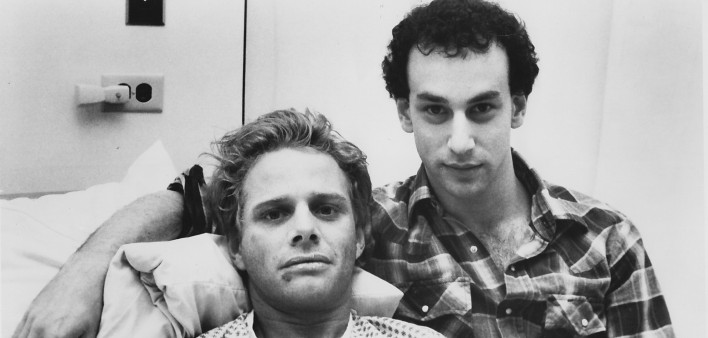
Philadelphia. Longtime Companion. An Early Frost. What do these movies have in common? If you answered that they are some of the first movies made about the AIDS epidemic you are correct.
These movies are generally widely known with Tom Hanks even winning his first Oscar for Philadelphia. And if you were at a dinner party with eight gay men tonight and you asked them what was the first movie made about AIDS chances are they would say An Early Frost— but they would be wrong.
A few months before An Early Frost premiered in 1985, another tv movie, long forgotten, called Buddies was centered on an unexpected relationship between two gay men. One, alone and dying in a hospital bed the other his “buddy.” The movie was inspired by the Gay Mens Health Crisis and its Buddy program.
Started in NYC in 1982, the original program trained volunteers to act as “buddies” for people with AIDS, helping them get to doctors, clean their homes and run errands, or just offering friendship. – poz.com
Buddies, newly discovered and digitally restored, was recently released on DVD to coincide with World AIDS Day and is now taking its rightful place in history as the first feature film about the AIDS epidemic.
The film, written, produced and directed by Arthur J Bressan Jr. was filmed in 9 days in Washington DC and New York City. The budget – $27,000, a shoestring miniscule budget for a movie – even back then. Sadly Bressan, along with one of the stars Geoff Edholm themselves both died from AIDS related complications.
Edholm plays Robert, a once outspoken, loud, in your face, political gay man. Once an Adonis Robert lies wasting away and dying due to pneumonia and Kaposi Sarcoma. Shunned by family, abandoned by his friends Robert is alone in a quarantined room at St. Matthews Hospital in New York City.
Robert gets “assigned” a “buddy” through “the Center” and in walks David, played by David Schachter). The two men could not be more different. David is young, shy, quiet, apolitical and lives with his boyfriend. He doesn’t attend Gay Day, what we now call Gay Pride. He seems unsure of himself and not completely comfortable with his sexuality.
As David walks in to the hospital room – per orders of the hospital – he is wearing a surgical gown and a mask. Viewers are immediately transported back in time with a stark visual of what AIDS in 1985 looked like and felt like. The fear, the shame, the isolation.
Robert and David are the only two people seen through out the entire movie. Other characters appear behind curtains or are spoken to on the phone, but never seen. The two men clash initially at first over the course of many months and grow to truly respect and love – in their own way – each other which neither man was expecting.
A Poz Magazine film review spoke about the relevance of this even then and now:
“On the one hand, the film is a work of fiction inspired by real life’s 1982 GMHC Buddy program, New York’s St. Vincent’s Hospital, and the countless gay men like Robert and David who died of and survived AIDS; on the other hand, it mirrors our present-day reality, where the criminalization of HIV, inequitable access to health care and medications, and diminishing funds for research serve as obstacles to progress in the fight against HIV/AIDS.”
Mark M, 56, a retail store manager in NYC remembers watching the movie and thinking “finally a movie about AIDS and what is happening.” But he also thought to himself “Is this it? One movie? Is this all we get?” Twenty-three at the time Mark adds, “I was just coming out, it was a time of profound fear. I was scared for my own well being during a health crisis that was not receiving the funding since it was the ‘gay disease’.”
The re-release and resurgence of Buddies It’s all thanks to the efforts of film historian Jenni Olson, who worked with Bressan’s sister, Roe Bressan, to secure the rights to the movie, and cult-film distributor Vinegar Syndrome, which has issued a Buddies DVD/Blu-ray combo pack of the film for sale.
In keeping with resurgence theme GMHC relaunched the iconic Buddy program in 2015. Listening to their clients, GMHC learned how many of them, mostly long term survivors, felt forgotten and isolated as they struggle with stress, loss, addiction, stigma and depression.
The first movie made about the AIDS epidemic is still resonating with generations born a decade after the movie premiered. The lessons the movie teaches us stay with us long after the credits roll.
Sources: The Guardian, Wikipedia, Poz,

so sorry I missed this movie but will look for it
I dont remember this one but def want to see. Am I missing a link to order the film? Are they going to do any Streaming for it?
The best place to see the film is via Vimeo On Demand. Here’s a link to the Bressan Project website which includes the link to watch on Vimeo as well as more info about Arthur’s other films. Thanks! https://bressanproject.wixsite.com/website